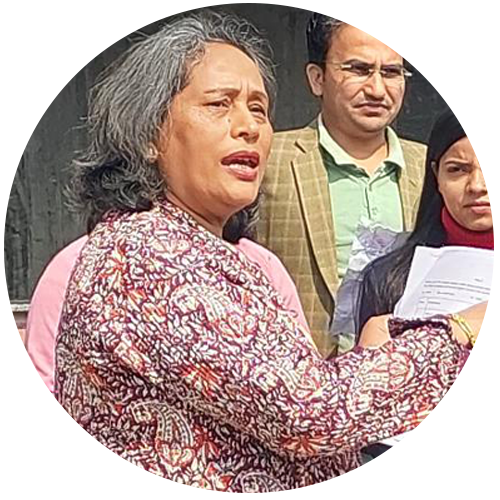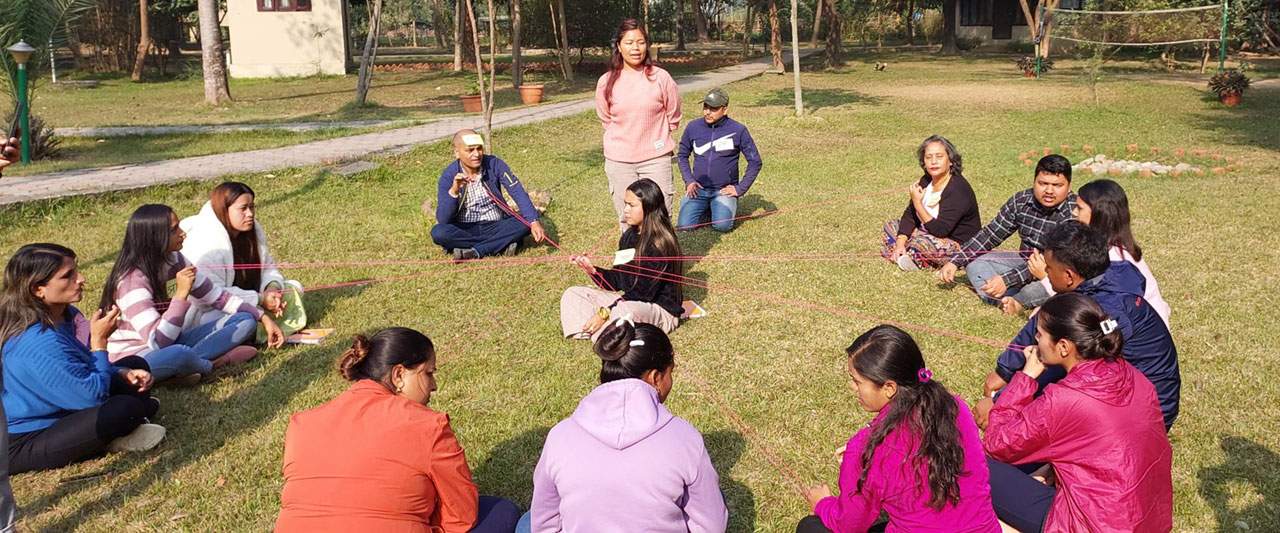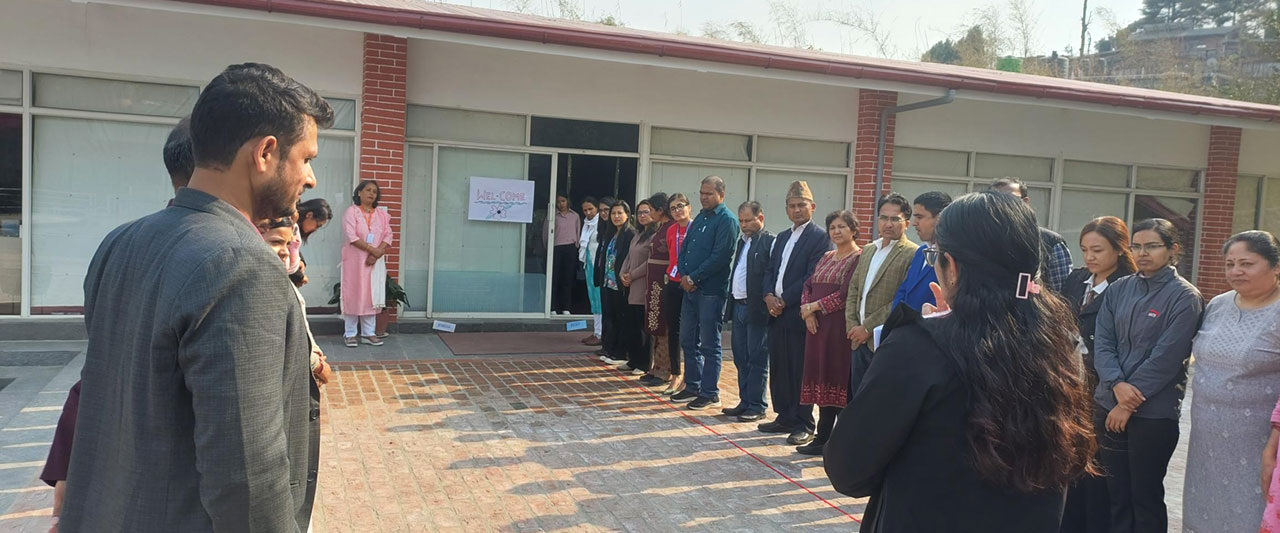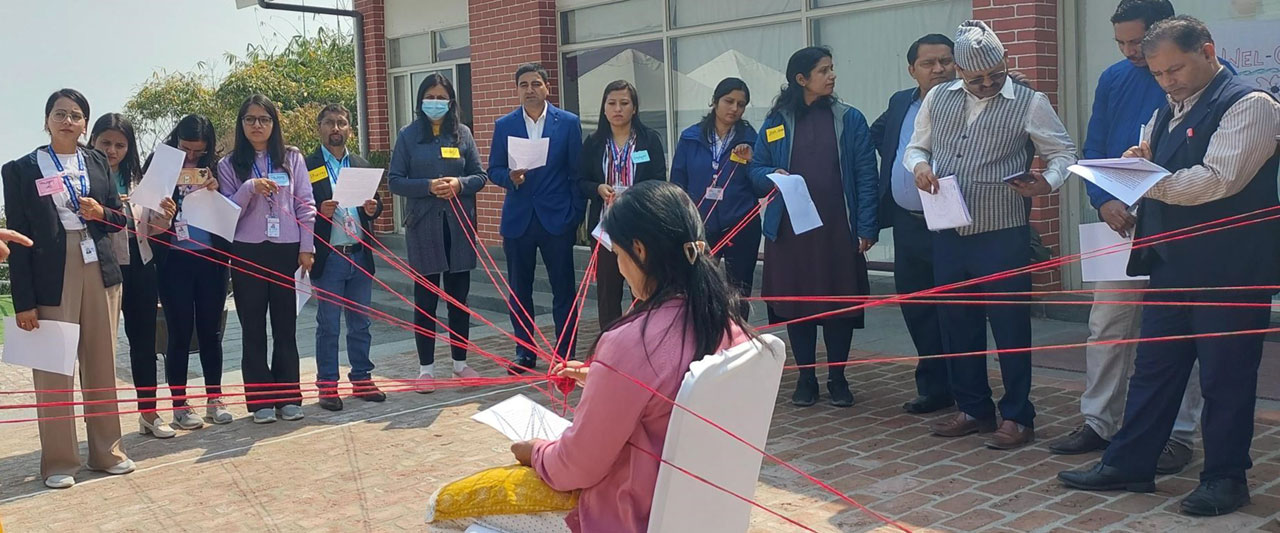Amid the towering Himalayas in Nepal, attitudes about abortion have been changing. In 2002, abortion went from being criminalized to being legal for any reason up to 12 weeks of pregnancy. Since then, access has only expanded.
Dr. Deeb Shrestha Dangol, a dedicated OB-GYN and head of health systems and policy for Ipas Nepal, has stood at the forefront of this transformation. Navigating a shifting landscape of abortion rights and stigma, she has fought to expand abortion access in Nepal for over twenty years.

Dr. Deeb’s journey as a doctor and an abortion rights advocate led her to an Ipas training approach called abortion values clarification for action and transformation (VCAT). Through this comprehensive method of challenging abortion stigma, she has helped expand safe abortion care in Nepal.
Today in Nepal, abortion VCAT training boasts national recognition. It is conducted by government trainers and partners using the government’s own national abortion VCAT guideline—created in collaboration with Dr. Deeb and Ipas Nepal.
What’s abortion VCAT?
The World Health Organization recommends “values clarification” exercises for abortion providers to address abortion stigma. Ipas has been conducting abortion values clarification for action and transformation (VCAT) workshops and providing resources for workshop facilitators across the world for two decades.
Abortion VCAT helps people explore their assumptions about abortion and examine their role in assuring people’s access to safe abortion care. Abortion VCAT exercises are proven to help people understand the critical importance of abortion access and become more comfortable and confident as advocates, health workers and community members who support abortion rights.

Participants in an abortion VCAT workshop engage in an activity called “Why did she die?” where they are confronted with the tragic consequences that can occur when access to safe abortion is restricted. They discuss one woman’s experience and talk about their own beliefs and duty to offer proper medical care to prevent unnecessary deaths.
Meeting a rising demand
“We faced not only medical challenges but also deeply rooted societal beliefs,” Dr. Deeb recalls, reflecting on the difficulties of providing postabortion care (treatment for the complications of unsafe abortion) before legalization. As a provider, it pained her to see so many women with critical injuries due to unsafe abortion methods. To prevent the deaths and injuries being caused by unsafe procedures, Nepal’s government finally legalized abortion in 2002. After many long years of advocacy by Ipas, partners, and dedicated local providers like Dr. Deeb, it was a relief. At the time, she worked at the sole maternity hospital in Kathmandu, where the very first legal abortion service in Nepal was offered.
With increased legal access to abortion, health providers needed training in abortion care, and the need kept growing. Dr. Deeb attended an abortion VCAT workshop shortly after joining Ipas in 2011, and it would play a pivotal role in the trajectory of her career.
‘She had no idea that abortion was such a public health issue’
“At the time, VCAT was focused on the providers,” says Dr. Deeb. “As an OB-GYN myself, I attended, and saw firsthand how this could impact stigma reduction in a powerful way.”
As a participant witnessing the discomfort with English among nurses and providers from rural areas, Dr. Deeb stepped in as a co-facilitator from the very beginning, translating complex concepts into Nepali. She’s been leading VCAT workshops ever since.
She remembers a comment from a public health nurse who oversaw certification for health facilities offering abortion services. “She said that before the training, she’d ‘had no idea that abortion was such a public health issue’ and that she now realized the need to scale up and provide this training at a bigger level.”
Each additional VCAT training revealed another need for expansion; barriers caused by abortion stigma did not stop with health providers. Scaling up meant including “gatekeepers” to care at all levels of the health system. Receptionists, for example, were often the first point of contact and needed education on confidentiality and abortion stigma.
“As part of their job, receptionists would ask people out loud, ‘Why are you here?’ There was such a stigma; we didn’t want people losing their privacy,” explains Dr. Deeb.
“We even included the guards because we heard people coming for safe abortion services were being turned back from the gate itself,” she continues. “Because the guards didn’t know that abortion was legal and being provided in the facility.”
Interest in VCAT swelled, with so many participants at a single training that they would often have to move outside to accommodate them all. With groups averaging 40 people at a time, Dr. Deeb and her team would start with the basics.
“We wanted them to first understand that abortion is legal in Nepal,” she explains. “Then we would move to deeper discussions, where you are able to touch people’s hearts and create points of real understanding and compassion.”

Participants in an abortion VCAT workshop engage in an activity called “Cross the Line” that helps them begin to reflect on their personal
views, get a sense of the range of views on and experiences with abortion and understand how cultural norms and stigma affect
people’s diverse views and experiences.
For over a decade, abortion VCAT training by Ipas Nepal, often led by Dr. Deeb, made a tremendous impact on the health system of Nepal, breaking down abortion stigma and expanding access to quality abortion care. Between 2012 and 2019, 55 abortion VCAT workshops reached 1,880 participants across 37 health facilities.
participants across 37 health facilities between 2012 - 2019
Boosting confidence and understanding
A 2023 assessment of VCAT workshops in Nepal shows that people’s ability to express their thoughts on abortion—and respect the beliefs of others—dramatically improved.
Before and after their VCAT workshops, 220 participants completed a survey. Initially, only 54% felt confident explaining their beliefs, but after the workshop, this number surged to 79%—a significant increase.
Not only did they understand themselves better, but they understood and respected the beliefs of others better. The percentage of women who strongly agreed with the statement “I can respectfully explain values concerning abortion that conflict with mine” rose 34 points, and for men, it rose 17 points.
These findings underscore the transformative power of VCAT in fostering nuanced conversations and empowering individuals to voice their beliefs and respect those of others on a complex issue like abortion.
%
of participants felt confident explaining their beliefs after their VCAT workshop
In their words:
Participants share their experience with abortion VCAT
Challenges remain. Abortion VCAT can help.
Despite legalization, abortion access remains challenging for many—and some still resort to abortion with unsafe methods and suffer death or injury as a result. Stigma and financial barriers remain, and it is especially difficult for women from remote areas to access safe abortion care. The government offers free abortion services, but they are limited and only available at public health facilities.
Yet abortion VCAT workshops have the power to improve the health system from within and have turned gatekeepers into champions, with participants seeing the value firsthand and becoming active promoters as their careers evolve.
“A provider from one of the remote districts that attended a VCAT went on to become the director general for the Ministry of Health,” says Dr. Deeb. “So, it is easy for them to understand the value of VCAT because he was in the training himself.”
In fact, the government of Nepal demonstrated how highly valued abortion VCAT had become in 2019 by including it in the national safe abortion training curriculum for providers. In addition, the proactive advocacy and technical support of Dr. Deeb and the Ipas Nepal team led the government to develop the national VCAT guideline, which draws on both global practices and local contexts.
“When the Family Welfare Division program developers themselves endorse the effectiveness of abortion VCAT, it speaks volumes,” shares Dr. Deeb. “To have them be the ones championing abortion VCAT outside of government and saying ‘we need to take it to the community and policymaker levels’ demonstrates how this work has created a new awareness about the need to combat discrimination around abortion.”
“Even with better healthcare systems and medical supplies, unsafe abortions are still common. To make safe abortions truly accessible, we need to change how we think about abortion and those who need them. Open and honest discussions through VCAT about abortion are a powerful tool for building understanding and respect for those seeking an abortion.”
Dr. Dipendra Raman Singh, Director General, Department of Health Service
“Many studies show that women who have abortions face stigma, discrimination and unfair treatment. To help change this, VCAT is designed to shift attitudes and values about abortion through workshops and activities involving various groups. I would like to thank the maternal and newborn health section of the Family Welfare Division and Ipas Nepal for their help in creating the guideline.”
Dr. Bibek Kumar Lal, Director, Family Welfare Division
Change that lasts
Dr. Deeb’s initial steps as a VCAT co-facilitator have helped grow a nationwide movement promoting abortion access and challenging stigma. Her journey exemplifies the power of individual dedication and strategic partnerships in creating lasting change.
Learn more about how Ipas is using this powerful tool to dismantle abortion stigma all around the world.


